Sunday Punch
Who killed Cock Robin?
First off the mark was the then President Rajapaksa. Returning from Jordan, two days later after the Tiger Supremo’s swift death had been announced, his first act after climbing down the plane’s ramp steps and setting foot on Lankan ground was to go down on his knees and worship the Katunayake tarmac, to humble himself in the dust and kiss the ground he would thereafter walk unchallenged and grab the kudos whole as the man who won the war alone.
 When he rose from his all four pose he had already crowned himself king, as the sole vanquisher of the demon who, without remorse, had stalked the streets of Lanka, ruthlessly preying upon the innocents, who had drunk their blood and eaten their flesh to fatten his bizarre nightmare of creating a kingdom of hell on thrice blessed Lankan soil. And the masses bowed before his claim and swallowed it whole.
When he rose from his all four pose he had already crowned himself king, as the sole vanquisher of the demon who, without remorse, had stalked the streets of Lanka, ruthlessly preying upon the innocents, who had drunk their blood and eaten their flesh to fatten his bizarre nightmare of creating a kingdom of hell on thrice blessed Lankan soil. And the masses bowed before his claim and swallowed it whole.
But his claim to be the sole architect of a nation’s collective triumph — to claim it as his own and no other’s — was soon to be challenged. And it came from within the ranks.
The Army Commander, General Sarath Fonseka, who plunged his bayonet into Rajapaksa’s claim and staked his own credentials on his right to be recognised as the one who truly won the war. His position was that, whilst the president cooled his heels at his air-conditioned Temple Tree office, he, General Sarath Fonseka, was sweating it out directly in the line of enemy fire on the battlefield, fearlessly commanding his troops and leading them on to victory.
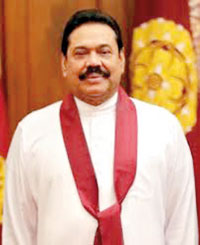
Mahinda: Absent from Lanka
His elder brother Sisira Fonseka added support to his claim. Writing from Australia to the Sunday Times of April 18, 2010, the proud and fond sibling said: “All Sri Lankans and their friends know and would never forget the unique and yeoman service that my brother, General Sarath Fonseka, provided to the nation by being the main architect of the war victory that liberated Sri Lankans from terror. Bringing in bogus allegations and harassing him in the inhumane and shameful manner in which he is being treated now can only bring bad ‘kamma’ and also shame to our country.”
In cricketing parlance, it now became a matter to be referred to the third umpire. The question: When Lanka won cricket’s World Cup in 1996 was it the captain on the field who merited the trophy of credit or was it the Chief of the Selection Committee who had chosen him as captain of the team who deserved the honour to claim it as his own and be entitled to take it home with him to be hung in his own home parlour of achievement. Alas there was no third umpire at hand to adjudicate.
But there was another contender for the grand kudos award. The President’s own younger brother, Gotabaya Rajapaksa, the then Defence Secretary. Of course he could not claim it directly. He could not overshadow his elder brother’s self-proclaimed achievement as being the ultimate war hero nor usurp the credit cup he had bagged for himself. But though he could not say of his own right to the prize in a few words, he discreetly managed to convey it in thousands contained in a book titled Gota’s War’, published in 2012, where Lanka’s 30-year-long terrorist war became personalised, became not the nation’s war but his own personal battle which was won handsomely only due to his direction and defacto command.
The book’s blurb reads at the end: “Yet by 2009, the LTTE military organisation lay completely annihilated by President Mahinda Rajapaksa’s Government. At the centre of it all stood presidential sibling Gotabaya Rajapaksa.”
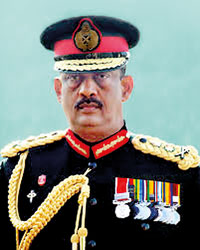
Fonseka: Missing in action
And its introduction makes clear again at the end who won the war: “Without Mahinda there would have been no decision to wage war. Without Gotabaya, no victory.”
The message was clear. Brother Mahinda would have waged the war but it was Gota who brought the Golden Fleece home. The man who stole victory from the Tiger jaws of defeat.
With Gota’s appearance in the ring, it now became a three-cornered battle for the war crown, staged between a politician, a public servant and an army general.
This was then the triumvirate the nation generally accepted as having won the war, though the three musketeers individually contended that it was only due to his own personal effort that the war was won; and wore their own hats of victory, and sometimes spoke through it, to hail their own personal glory as being the sole savior of Lanka.
But now, when all had thought the dust had settled, a Fourth Musketeer has arrived at the gates to raise the dust again: not so much as to claim sole credit for winning the war but to assert to those not in the know his own immense contribution to the war effort which made final victory possible. To claim that he alone held the fort during the last two weeks of the 30-year-long war, whilst the other Three Musketeers had fled the country out of fear for their lives.
It was at a meeting held last week, 8,750 miles away from Colombo in New York City, with a group of Sri Lankan expatriates, when President Maithripala Sirisena hove the bombshell.
Sirisena spoke for the first time of what he considered to be his indispensable bit to make final triumph possible. He claimed that Tamil Tigers planned a flight from neighbouring Tamil Nadu to destroy targets in Colombo and the top political and military leadership had gone abroad to escape the possible attack aerial bombing.
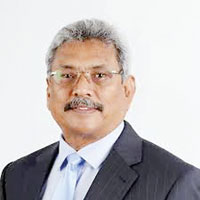
Gotabaya: Not there, says Maithri
In a speech delivered to the group, he declared: “No one knows more than I do of what really happened during the last two weeks of the war. During these final two weeks until the war ended, I was the acting Minister of Defence. The then president was not in the country, the then Prime Minister was not in the country, the Army Commander was not in the country, the Defence Secretary was not in the country during these last two final weeks. A lot of people have forgotten about this. They also do not know why these people left the country. But I know why they left.”
“In the final two weeks the intelligence we had received was that the LTTE would not surrender but was preparing for the final strike. The Government received information that, from South India, from the jungles of Chennai or somewhere like that, the LTTE was planning a massive air strike, dropping bombs from above to destroy Colombo. That is why they all left the country. That is the true story. In those last two weeks, I was not in Colombo myself. In those last two weeks I was at different places in the country, thinking the LTTE would know where I was located. That is my experience of war.”
The first one to shoot down Sirisena’s claim that the top brass had fled the country during the last weeks whilst he alone had stayed in Lanka was the then Army Commander now Field Marshal Fonseka.
And didn’t he, a minister of Sirisena’s government, come out strong, shooting the claim down not with a single bullet but shelling it out of existence with his own brand of a verbal cluster bomb.
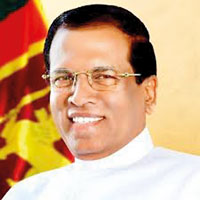
Maithripala: I held the fort alone
It was the moment that made the old war horse Fonseka even hop into bed with the former regime’s President and Defence Secretary, his sworn foes, and swear by them. “The former president was out of the country, even I had to go to China. We don’t have to be pressing the trigger. In the final two weeks, it was a job for corporals and sergeants.
“Those who think like corporals and sergeants may think it was in the final two weeks one could display capability, show results. Can a person who was acting defence minister for two weeks understand the complexities of a war that was going on for over two years,”
He said even his erstwhile ally Gotabaya Rajapaksa did not leave the country in the final two weeks of the war as claimed by Sirisena.
Mahinda Rajapaksa’s response was cool. He merely said that he agreed with the comments expressed by Field Marshall Fonseka. On Monday he said he agreed with Fonseka’s denial of Sirisena’s claim that he had been in sole charge of the war effort in the final two weeks of the Vanni offensive as the then President, Defence Secretary and the Army Chief were out of the country. He said: “Even little children knew how the war had been brought to an end.”
Gotabaya, however, has not still commented. Perhaps he has dismissed the Sirisena claim as being below his dignity to pass remark.
But for all the disclaimers made by the Three Musketeers who claim sole credit for winning the war and the newly arrived Fourth Musketeer after the war had finished nine years ago to sneak a sip out of the war goblet held by the others, many questions need to be asked.
The first is to Sarath Fonseka and concerns his haughty comment: “The former president was out of the country, even I had to go to China. We don’t have to be pressing the trigger. In the final two weeks, it was a job for corporals and sergeants.”
As in cricket where the match is not decided until the last ball is bowled, so in war is victory only ensured when the last cannon is fired and the enemy is annihilated. So was it the corporals and sergeants who pressed the trigger and finished the job whilst their commander was sojourning in China, for whatever reason?
The second pose is this: In the same manner shouldn’t the then president, knowing full well the end was drawing near, have stayed at home as the commander in chief of the Tri Forces, to see the war finished as it reached its crucial climax, instead of going on some Jordan jaunt? Rather than leave it in the hands of ‘corporals and sergeants,’ as the then Army Commander – who himself was abroad – put it last week?
The third question: Sirisena claimed that ‘The then president was not in the country, the then Prime Minister was not in the country, the Army Commander was not in the country, the Defence Secretary was not in the country during these last two final weeks.’ And that he was the only one left to hold fort against a devastating aerial bombing attack by the LTTE to destroy Colombo.
But then President Sirisena, frank man as he is, had to say that he too fled, not the country like the others but Colombo – the LTTE target for mass destruction, as he claimed Government intelligence had revealed to him – and remained during that period in many parts of the island, because he did not want the LTTE to know the exact locale where he was.
Apparently the naval tradition of the Captain going down with the ship was nonexistent during the last two weeks of the Eelam War. According to Sirisena, he himself included, it was a matter of the captain and his chief officers jumping onto the first available lifeboat and leaving the threatened ship bearing passengers to drown in its watery fate.
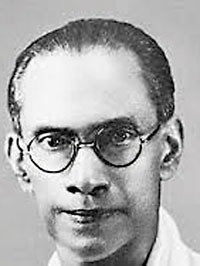 SWRD: Silver tongued orator When S. W. R. D. Bandaranaike, having broken away from the UNP and founded the SLFP and became Prime Minister in 1956, his coalition partners claimed in Parliament that it was due to their individual efforts and support that had enabled Bandaranaike to defeat the UNP and wear the prime ministerial crown, Bandaranaike rose from his seat to flay their claims with a few lines from a nursery rhyme He did not give a lengthy speech. He merely asked: Who killed Cock Robin? “Who killed Cock Robin? I, said the Sparrow, with my bow and arrow, I killed Cock Robin. | |
In other words, Sirisena’s allegations, be they true or be they denied by the other musketeers for their own compelling reasons, reveal a salient and revealing point in the behaviour of leaders in this country.
Maithripala Sirisena is the present president. And as such his words, his allegations, his claims of what transpired during the last two weeks of the war cannot be summarily dismissed as pure bunkum. The man’s words have to be treated seriously and respectfully taken as gospel truth until a future commission of inquiry appointed by him to affirm its validity, followed by a court of law to affirm its truth, hold otherwise. So taking his words at face value, the position he revealed is thus:
Colombo’s citizens were left in the lurch to face helpless the devastation of the Tigers final bombing onslaught from the air, as revealed by Sirisena according to the intelligence he had received whilst he was the acting man in charge of defence. He himself had made himself scarce in different places of the country to flee death. Never mind what happened to his charge, the people of the capital, facing as they did unaware of the Tiger bombing threat. Perhaps if the threat was indeed true, the question must be asked why weren’t emergency steps taken, even discreetly, to warn the populace and take measures to evacuate the city to some safer joint?
Whilst the nation’s leaders as Sirisena claimed – had fled from the capital only to return to it triumphant to claim the credit after the threat had passed and the war had proceeded to its final finish and had been won by — as the Field Marshal put it – “corporals and sergeants, with their fingers pressing the trigger, ” the final question is:
So who really won the war? Was it the foot soldier: The corporal, the sergeant with their fingers pressed on the trigger as they faced deadly Tiger fire?
What credit has been given unto them – they who sacrificed their lives, they who were left maimed and disabled for life, they who placed their lives on the line to make victory possible — except to say they assisted in the victory achieved by their superiors: the politician, the general and the public servant? Except to have the golden heroes’ medal pinned on their chest and posthumous honour nailed on their lion draped coffins? And have a monument erected for the fallen, aptly named as a memorial to the ‘Unknown Soldier’.
For that’s what they were then and still are: The Expendables.
In 1983, when the then British Prime Minister had ordered that the British forces to save the Falkland Islands from Argentinean occupation and arrogated full credit to herself when the forces did their job and liberated the far flung British island from Argie domination, the leader of the opposition the Labour leader Neil Kinnock had this to say: “What a pity that British soldiers had to have their guts strewn upon the Falkland beaches just to prove that Mrs. Thatcher had guts.”
Not only in Lanka but all over the world that seems to be the way of all politicians. To adorn the dead and brave soldier with posthumous glory with Britain’s Victoria Cross, or the USA’s Medal of Honour, or India’s Param Vir Chakra, or Sri Lanka’s Parama Veera Vibushanaya, or Zimbabwe’s Gold Cross which Mugabe dishes out liberally to those loyal to him, just to ensure the political bosses who award them can enjoy continued prosperity in office.
Life is but a chess game. With the King and the Queen, the Bishops and the Knights employing dispensable Pawns to guard the Castle walls. And made to sacrifice their lives to safeguard the dear lives of those within.
| Mangala closes garage doors after MPs bolt with their cars Suddenly there’s a visible change in the air. For the wind, that once blew through Caligula’s extravagant court, howled amidst Nero’s orgies, breezed through St Augustine’s monastery and peeped into the poverty clad order of St. Francis of Assisi, has chosen to visit these island shores to blow deep into politicians nostrils and recommend to them that the time had come to choose between Caligula and Augustine, between Nero and St. Francis. 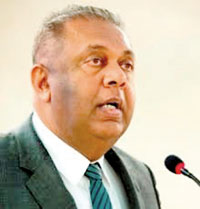 Mangala: Where have all the duty free cars gone? The only question is: has that much-travelled wind come too late to make a meaningful change? Whether it would have been far better and more profitable for it to have lashed its gusts against the Pidurangala rock and enjoyed the Backside Boys in action or taken its breeze next door and visited the topless damsels of Sigiriya rather than let off steam and expend its energy by banging against the ear drums of ministers in a bid to blow some life and sense into their attics? One minister it would probably have visited may have been the Hon. Mangala Samaraweera at his picturesque Bolgoda residence. But, however much it may have banged the doors or tried to creep in through some open window, it seems that it did not succeed blowing into the Honourable Minister’s ears the folly of extravagance it had witnessed at Caligula’s Court and the pathetic extreme of excessive poverty as it had seen in some reclusive saint’s ashram; and thus denied audience fled away frustrated to some other eastern shore like Singapore to receive a more welcome ear as to the virtue of moderation. But though sagacious advise may have gone with the wind, yet one senses it may have left something of note behind at Bolgoda Lake, except it cometh belated to be of any value. Out of all the ministers in the pantheon of Maithripala Sirisena’s cabinet the ever shining light of liberalism is, without doubt, Mangala Samaraweera. But whilst he may consider himself to be the Ganapathy of wisdom, his duty as the Finance Minister of the country to be the Lakshmi of the nation’s prosperity leaves much to be desired and has cast him in bad light. Gas prices raised. Hoppers up. Rail fares raised. Food prices up. Cost of living up. Not good. At least the Lankan rupee was hitting six after six against the US dollar as if it was playing a twenty-twenty on an economic ground specially prepared for Lanka’s batsmen to take the scoreboard to a new high. As Trump would put it: Not good. Mangala Samaraweera, no doubt, would have realised, that this state of affairs could not go on for long. And that sacrifices would have to be made. Realised that austerity was the call of the hour to curb this absurd run rate. And that the example had to be set from the top. Last week he announced that from next year forth, no duty free permits would be granted to any of the 225 members in parliament. Good. Jolly Good. Except for one thing. By the time he strolled out to close the garage doors, all 225 cars had been taken out. Plus another three. n The additional permits have been for Piyasena Gamage (Galle District, in place of Geetha Kumarasinghe who was unseated.) n Sarath Fonseka was appointed as a National List MP in February 2016 in place of Lands Minister M.K.A.D.S. Gunawardena who passed away. So according to the Minister’s dictate, come next year, no duty-free permits will be issued to any MPs. No problem there. No opposition by any of the members of the House. For there will be no takers. For what has to be taken has already been taken and immediately converted to cash. | |


Leave a Reply
Post Comment